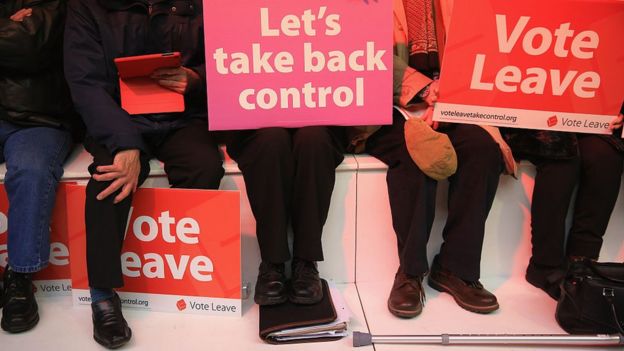- 48 minutes ago
- Business
The Bank of England has given its starkest warning yet that a UK vote to leave the EU could hit the economy.
Mark Carney, the Bank's governor, warned that the risks of leaving "could possibly include a technical recession".
Prime Minister David Cameron said the warning amounted to "a very clear message" of the dangers of Brexit.
Vote Leave campaigners have strongly criticised Mr Carney, with one calling for him to resign.
The latest minutes from the Bank's Monetary Policy Committee (MPC) said that a leave vote may cause both growth and sterling to fall and unemployment to rise.
Mr Carney said the Bank had not compiled formal forecasts about the possibility of a recession - defined as two consecutive quarters of negative growth - resulting from a Brexit vote.
Chancellor George Osborne said the UK now had a "clear and unequivocal warning" from the MPC as well as the Governor of the Bank of England about the risks of a Leave vote,
"The Bank is saying that it would face a trade-off between stabilising inflation on one hand and stabilising output and employment on the other," he said.
"So either families would face lower incomes because inflation would be higher, or the economy would be weaker with a hit to jobs and livelihoods. This is a lose-lose situation for Britain. Either way, we'd be poorer."
Jacob Rees Mogg, a Tory MP and Treasury Select Committee member, called on Mr Carney to resign.
"I think it is unprecedented for the governor of a central bank to suggest that people should short his own currency. Suggesting sterling will fall sharply is simply not what responsible central bankers do," he said.
Lord Lamont, the former Chancellor and Vote Leave spokesman, said: "The governor should be careful that he doesn't cause a crisis. If his unwise words become self-fulfilling, the responsibility will be the governor's and the governor's alone. A prudent governor would simply have said that 'we are prepared for all eventualities'."
 GETTY IMAGES
GETTY IMAGES
The Bank's latest quarterly Inflation Report, released on Thursday, predicted that economic growth would slow in the second quarter of the year, but pick up in the second half. It also cut the growth outlook for the next three years.
The report also forecast that inflation would reach 0.9% in September if long as the UK stayed in the EU.
The MPC unanimously voted to keep interest rates at 0.5%.
Analysis: Kamal Ahmed, economics editor
In the Bank of England's assessment of the health of the UK economy, one ringing sentence jumps out: "The most significant risks to the [economic] forecast concern the referendum," the Monetary Policy Committee says.
It goes on to reveal that far from this simply being a judgement on what Bank officials describe as the "uncertainty spike" around the fact the referendum is taking place at all - this is a judgement that Brexit would have a material effect on the economy.
In a Bank world of carefully chosen words, "material" means significant. And significantly downwards.
The Inflation Report said that uncertainty over the EU referendum was already weighing on economic activity: "There is evidence that a material proportion of the 9% fall in sterling exchange rate since its peak in November could reflect referendum effects.
"It is hard to judge how much of the slowdown reflects a loss of underlying momentum and so may persist and how much is likely to unwind if uncertainty recedes following the referendum. Referendum effects will also make it harder to interpret economic indicators over the next few months."
Nick Stamenkovic, strategist at RIA Capital Markets, said: "The clear message of the Bank of England is that they are in no hurry to do anything until they assess the impact of the outcome of the referendum on the economy."
However, the inflation report noted that in the event of a leave vote, the MPC would face the difficult choice of raising rates to control inflation or lowering them to stimulate the economy.
The Report said that inflation probably fell back to 0.3% in April from 0.5% in March, reflecting the falls in oil and food prices over the last year and the strength of sterling in the same period.
It expected inflation to return to the target 2% level by mid-2018 as these factors faded out.

No comments:
Post a Comment